Why Does Car AC Smell Like Vinegar? [ Get Rid of Molds and Burnt Plastic Smell]
The acidic vinegar scent wafting from your car’s air vents likely stems from a buildup of fungi, bacteria and mold in the air conditioning system. As moisture condenses on the AC evaporator coil, it nurtures pungent mildew growths. Leaves and other organic matter sucked into ductwork also decay into stinky alcoholic fermentation. A clogged cabin air filter further fouls up airflow with musty contaminants. The dirty filter lets unhealthy pollutants permeate your car’s interior alongside that nasty vinegar smell. Worst case, a refrigerant leak mingles with all those rank odors for a truly unpleasant stench sensation. Regular AC maintenance cleans away smelly gunk, replacing degraded filters and sealing minor leaks.
A common problem that many car owners face is that their car’s air conditioning system smells like vinegar. In this post, we will explain the reason behind this unpleasant odor and show you how to get rid of it.
The best way to remove a vinegar smell from a car air conditioning system is to buy an HVAC antifungal spray. This spray will help prevent the growth of fungus and will eliminate any bad smells in the car.
If it doesn’t resolve the issue, you can take your car to your mechanic.
Why Does My Car AC Smell Like Vinegar?
Here are the possible reasons for a vinegar smell coming out of the car ac.
- Dust and debris in the car cabin air filter
- Dirty car intake and AC vents
- Leaking refrigerant of the car AC
- Moldy evaporator coil and fins
- Clogged catch basin of condensate
- Build up of organic material in car AC
- Damaged components of car AC
- Faulty Blower Motor
- Ozone emission from electric air conditioner motor
- Fuel fuel filter
- Faulty fuel pressure sensor
- Leaking chemical out of car battery
1. Dust and Debris in Car Cabin Air Filter
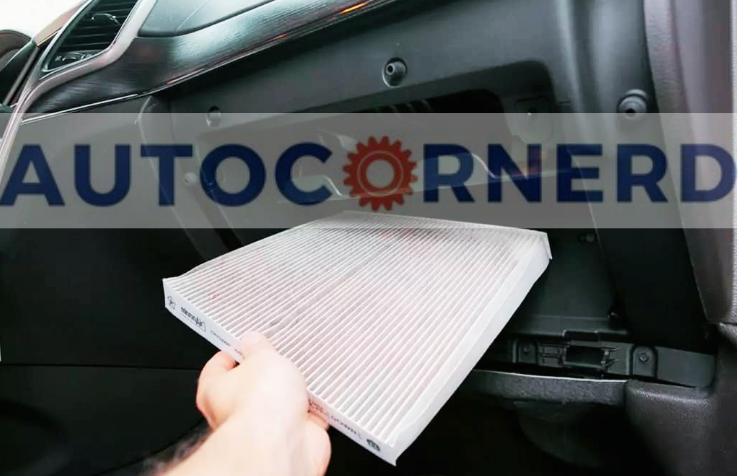
The cabin air filter is an important part of your car’s ventilation system. It helps remove dust, pollen, and other junk from the air before it enters your car.
This filter catches stuff that could make you sneeze or get itchy eyes. Your car tries to filter some of this out itself too. But after 15,000 to 30,000 miles, gunk builds up and the filter doesn’t work as well.
If your car starts to smell musty or vinegary, the filter likely needs swapping. Don’t wait – ask your mechanic to pop a new one in. I’d suggest a K&N cabin filter. It smells fresh like a clean rubber.
Check out the below video to learn how to replace the cabin air filter.
2. Dirty Car Intake and AC Vents

If changing the air filter does not eliminate the vinegar smell from AC in a car, there are chances that car intake vents are dirty.
Both the intake and AC vents of a car can be clogged with dust and mildews due to humidity and moisture traps. If vents are dirty, they tend to trap the fumes, which in turn can give rise to unpleasant odors.
Follow these steps to clean the car vents so that you can get rid of the vinegar-like smell in a car:
- Turn the interior (cabin) fan on to a maximum speed
- Roll down the window of car doors so that air can be exchanged
- Make sure to turn off the recirculate button so that the car interior can be replenished with the fresh outside air
- Take Lysol spray and spray it into the vents in front of the windshield. Lysol spray will kill 99% of bacteria and molds in the car vents. Moreover, the Lysol spray will also remove any organic material stuck clogged in the vents.
In this way, your car vents will be cleaned out of any kind of dust, organic material, and molds.
You can check out the below video to learn more about cleaning car vents.
3. Moldy Evaporator Coil and Fins
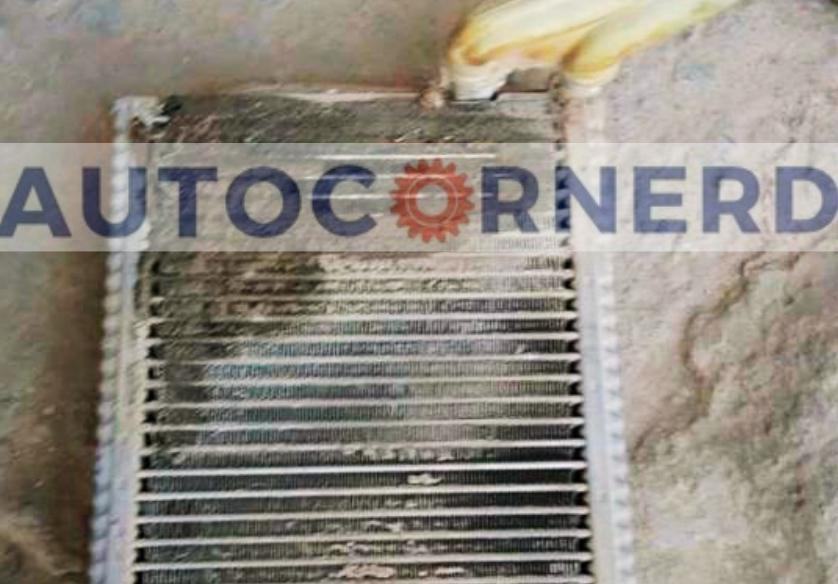
The molds that are grown on the evaporator coils and fins of the car air conditioning system due to the puddle of moisture also cause a vinegar smell from car AC.
This is because the water vapor in the air gets cooled down and condensed on the evaporator coil. Also, the A/C evaporator drain may be blocked and the buildup of water is causing the musty smell.
To prevent the buildup of moisture on the evaporator, I will recommend that you should turn the car A/C off a minute or two before you get home or park your car and leave the fan running to the max to dry the system out so that there is no condensation buildup on the car air conditioning system.
To clean the evaporator of car AC, you can use this Lubeguard Kool-IT Evaporator foam cleaner. All you need to do is to locate the condensate drain tube and inject the plastic extension of the foam cleaner into it. Resultantly, the cleaner will foam up and coat the entire evaporator coil. It will kill the mold and wash it down the drain, leaving a protective layer.
You can check out the video below to understand the procedure of removing the molds off the evaporator coils of a car air conditioner.
4. Clogged Catch Basin of Condensate
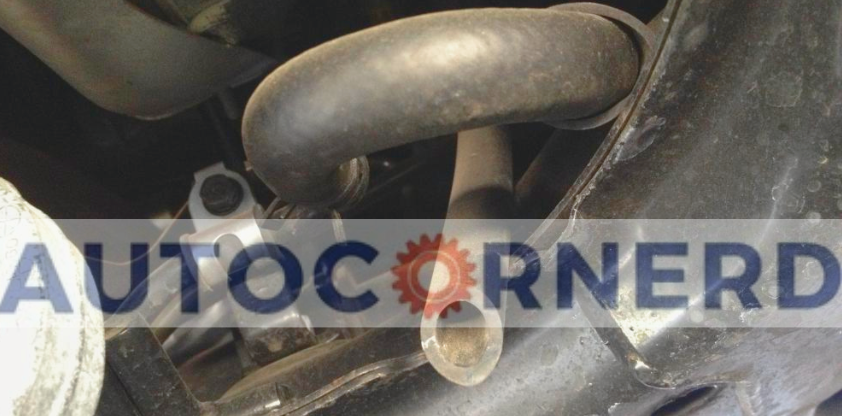
The condensate catcher fills up if debris blocks the drain line, causing water to build up. Then it leaks inside your vehicle and smells vinegary.
When the air conditioner runs, it generates moisture or condensate. This drains outside into a tube that leads down. But tree gunk and particles can clog the tube over time.
Inspect the whole drain, not just the visible parts. If you discover buildup, use a thin wire to clear any dirt chunks or fuzzy growths. That should restore free flow.
Algae and mold thrive on standing water from a plugged channel. Eventually the smell gets inside the cabin. To kill and remove them while unclogging the car’s condensate drain, I suggest Lubeguard Foam Cleaner as an option.
5. Coolant or Refrigerant is Leaking
The cooling system of a car relies on refrigerant, a liquid chemical that enables air conditioning. Unfortunately, refrigerant leaks can occur through various ways.
The common culprits leading to leaks include harm to the AC compressor, compromised seals, faulty links, poor repair jobs, and neglectful maintenance. As the refrigerant breaks down upon leaking, it emits a vinegary odor that grows stronger over time.
If you catch a sweet, bread-like scent instead, the issue likely lies with the coolant (or antifreeze). Monitor your coolant levels to check for depletion, which signals leakage from the heat core. Additionally, turn on the defrosters and inspect if they blow any oily residue onto the windshield. Dropping coolant quantities or greasy windshield smears warrant a dealership visit to test the heater core for perforations.
Chemical is Leaking Out of Car Battery
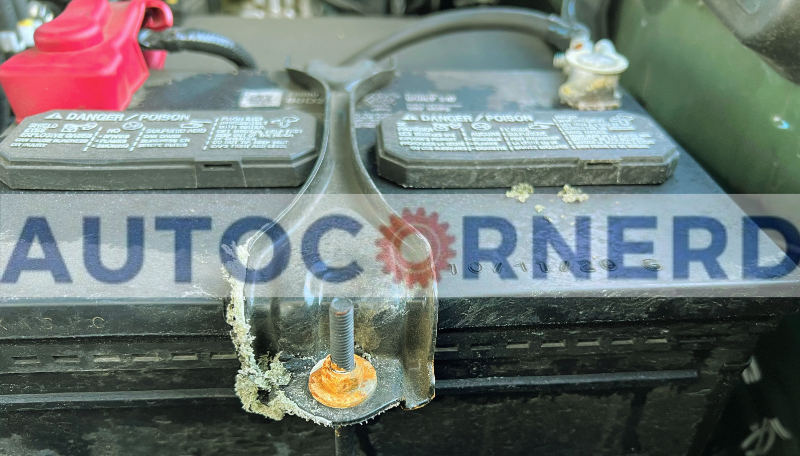
Lead acid or nickel metal hydride batteries can emit hydrogen sulfide when they fail. Hydrogen sulfide smells like a rotten egg which causes a pungent acidic smell in a car. The hydrogen sulfide gas is produced by the car battery when the electrolyte (chemical in the battery) level is quite low.
The vehicle’s battery may start to leak acid as it ages. This can happen because of corrosion in the terminals.
Also, overcharging will cause the car battery body to expand and leakage of electrolyte. If you are experiencing these symptoms, you need to take your vehicle to your dealership as soon as possible.
6. Faulty Blower Motor of Car AC
The blower motor is an electric device that pushes heated or cooled air into the car cabin.
The blower of a car AC is a motor and fan assembly fitted with electrical connections. If there is a burning plastic smell in a car, the chances are that the car AC blower motor is malfunctioning.
This usually happens when the electric connections of a blower are clogged with dust and debris.
7. Clogged Fuel Filter
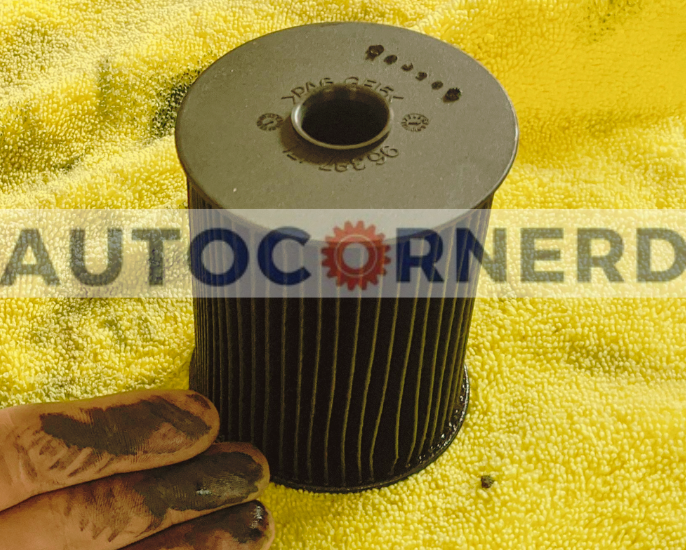
Much like our lungs filter oxygen, a car’s exhaust system strains out engine byproducts before they leave the tailpipe. This crucial emissions control system safeguards both vehicle and environment.
At its heart lies the catalytic converter, an ingenious pollution “scrubber” transforming toxic gases into harmless vapor. But this stage relies on an earlier one – fuel filtration. Here, a fuel filter captures contaminants that could corrode engine parts and disrupt combustion.
Should this sentinel component become clogged, unfiltered fuel burns inefficiently. The resulting exhaust may then carry an sharp, acidic smell, similar to vinegar. Hydrogen sulfide and other pungent compounds indicate improper fuel filtration.
Indeed, hard starting is a clear sign of a dirty fuel filter strangling the engine. Since this inexpensive component forestalls costlier damage, replace a strained fuel filter promptly.
8. Faulty Fuel Pressure Sensor
Even with a clean filter, bad smells may emit from the tailpipe.
The issue can originate in the fuel system. Namely, a malfunctioning fuel pressure regulator. This component determines the fuel amount entering the engine. Without the right fuel amount, combustion suffers.
Inside the chamber, fuel burns inefficiently. Unburnt fuel exits as exhaust. This overloads the catalytic converter. This emission control device processes exhaust before release. But it has limits.
The unfiltered exhaust exits via the tailpipe. It carries the poor combustion’s odors outward. As a result, you can detect these smells within the car.
How To Remove Vinegar-like Smell From The Car?
Follow these steps to remove the vinegar smell in a car.
- Make sure that the carpet on the passenger side floor of a car is not wet.
- If the cabin air filter is dirty, replace it.
- Turn off AC 5 minutes before parking your car and set the fan to the maximum while keeping the recirculation button off.
- Use shampoo to clean your car seats and mats regularly. It also improves the smell in the car.
- Try baking soda solution. Sprinkle it in the car. Let it settle for a few hours and vacuum it later. It helps neutralize the smell of vinegar in a car
- Check for things between the car seats and the center console. This gap between the car seats is where lost items go and rarely come out.
- Have preventive maintenance of important parts of a car such as fuel filter, pressure sensor, car battery, and AC blower motor.
FAQs
How does mold or mildew develop in the car’s AC system?
Mold or mildew can develop in the car’s AC system due to heat and moisture, especially in hot and humid climates.
Can the vinegar smell be caused by a leak in the battery?
Yes, if battery acid has leaked, it can add a sulfuric smell to the air from the AC system.
Is it possible for a mouse or small lizard to cause the vinegar smell in the car’s AC?
It is possible for a mouse or small lizard to get into the ventilation system and cause a fart-like smell. In such case, a disinfectant spray may not resolve the issue.
